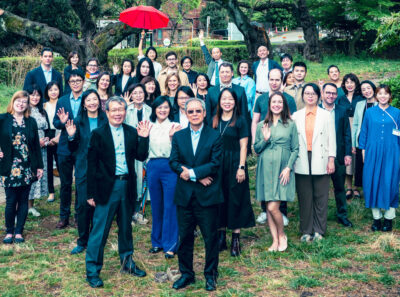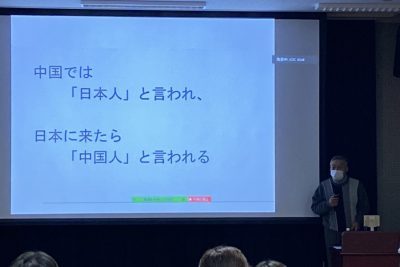The Future of Law and Language Education

This blog post was created as part of the "zengaku zemi" seminar "Life and Language in the 21st Century" offered at the University of Tokyo during the 2021-2022 academic year. In this course, undergraduate students from different fields of specialization chose a topic related to the influence of language in our everyday lives, developed their knowledge of that issue through research and collaborative learning, and shared their findings in class at the end of the semester. The content of this article presents the outcome of one of those research projects.
Author
NISHIKAWA Sora
Undergraduate Student, Human Sciences I, College of Arts and Sciences Junior Division, The University of Tokyo
「当事者カ其氏名又ハ商号ヲ相手方ニ示ササルヘキ旨ヲ仲立人ニ命シタルトキハ仲立人ハ第五百四十六条第一項ノ書面及ヒ前条第二項ノ謄本ニ其氏名又ハ商号ヲ記載スルコトヲ得ス」
“If a party orders a Broker not to disclose its name to the other party, the Broker shall enter that party's name in the document set forth in Article 546 paragraph (1) and in the transcript set forth in paragraph (2) of the preceding Article.”
The above quote is the text of Article 548 of the Commercial Code prior to its amendment in 2018. Until just three years ago, there remained laws written in a literary style using a mixture of kanji and katakana, not unlike the style used when these laws were first enacted during the Meiji Period. Even today, the language used in legal texts and the world of jurisprudence can prove problematic for even native speakers of Japanese.
In the following discussion, I examine the lack of public awareness in Japan related to law. I suggest that the intractability of Japanese law is a reason for this lack, and as a possible solution, I put forth the potential of a kind of "legal language education" (法言語教育). As a part of their vision for the "Shape of the Justice System in the 21st Century," justice system reforms underway since 1999 set as a part of the "establishment of the popular base" that "the people shall deepen their understanding of the justice system through various forms of involvement including participation in certain legal proceedings, and shall support the justice system" (Justice System Reform Council, 2001). Specifically, reforms such as the introduction of a jury system fall within this recommendation, and it is essential for the realization of this idea that the people have an understanding of law. During a time in which humanistic research is being actively curtailed, this topic envisions new discoveries through cross-disciplinary research as an ideal future of the humanities. I believe that by solving the problems associated with a lack of legal awareness among people in Japan, we can realize a way of life in which people look more closely at social institutions and take an active part in society.
One reason that Japanese law is seen as difficult to understand relates to language use.
First, let us consider the problem of having laws that are difficult to understand. There is a word known as niwari shihō (lit. '20% justice'), which refers to the fact that in Japan, only twenty percent of people have made use of legal services. According to a 2019 survey, only 20.4% of those who have encountered legal trouble have consulted with an attorney. Other than economic factors like cost, some of the reasons cited included psychological barriers like feeling that their problem was "not serious enough to consult a lawyer" (弁護士に頼むほどではない) or that they felt that "consulting a lawyer is a last resort" (弁護士に頼むのは最終手段である) (Bengoshi dotto komu, n.d.). At the root of such reasoning is likely the low level of public legal awareness in Japan caused by the inaccessibility of legal language.
When used in a legal setting, it is common for words to take on meanings that differ from their use in everyday conversation. As an example, let us consider three words: tadachi ni ('at once; immediately; right away'), sumiyaka ni ('quickly, promptly, rapidly'), and chien naku ('without delay'). One does not encounter chien naku often in day-to-day life, but tadachi ni and sumiyaka ni are both part of everyday language. If you look up tadachi ni and sumiyaka ni in the Kōjien dictionary, you can see that they appear to be synonymous, with definitions of "without a moment's delay, immediately, right away" (時を移さず。すぐに。じきに) and "quickly, without pause" (早いさま。ひまどらないさま。), respectively. In law, however, these words are used with a clear distinction between them. The following is a quote from a 1962 Osaka High Court decision: "Sumiyaka ni, much like tadachi ni and chien naku, is used to express a sense of temporal immediacy, but when distinguishing between these three words, tadachi ni has the strongest sense of immediacy, followed by sumiyaka ni and then chien naku, with the weakest of these being interpreted to mean that delay on justifiable or reasonable grounds is permissible" (Osaka High Court, 1962).
Another example relates to translation. This is a quote from Article 88 of the Civil Code.
(Natural Fruits and Legal Fruits)
Article 88
1. Products which are obtained from the intended use of a Thing are regarded as Natural Fruits.
2. Money or other Thing to be obtained in exchange for the use of any Thing are regarded as Legal Fruits.
The word "fruit" (kajitsu) used here is a direct translation of the Latin 'fructus.' In Latin, the word 'fructus' can refer to either a product of the soil or some kind of profit or gain, but because the use of the Japanese word kajitsu in this manner is limited to legal vocabulary, it creates a strange impression in this context (Hashiuchi and Horita, 2012).
How is it that legal language has taken on special meanings or expressions that differ from everyday language? First of all, legal terms are materials used in the settlement of legal issues, and as such, each term requires a strict definition. Furthermore, Furuta (2004) argues that Japanese legal terminology is purely technical and difficult for the general public to understand, while German and French legal terminology, the foundation of Japan's current law, is comprised of everyday language that anyone can understand, making law more accessible to the people.
Let us consider why Japanese legal language is difficult to understand. First, Japanese has a custom of implicature. One of the characteristics of the Japanese language is the use of words that express the core of the content that one is trying to convey while simultaneously implying various other meanings, making the periphery of the communicated content uncertain and changeable relative to the receiver (Kawashima, 1967). Another reason is that many Japanese legal terms are loanwords that are represented using kanji. According to Gibbons (2013), one of the problems with legal language in general is the use of archaic writing styles and foreign expressions, which in Japanese corresponds to the use of Sino-Japanese words. As pointed out by Nomura (2016), though kanji are excellent for coining new words and accommodating translated terms, they can also make it difficult to grasp the meaning.
Though my focus has so far been on the difficulty of understanding Japanese law, it is not my goal to argue that Japanese law itself is flawed or problematic. Rather, as can be seen from problems that arise with difficult language use in laws, it is necessary that non-specialists (i.e., the general public) be able to understand the basics of the law and the judicial system. For that reason, I believe there is a need for "legal education" (hō kyōiku), a term that here refers not to the kind of specialist or practical education administered at university law schools, but to a more general education on the fundamental tenets of the law. Legal education in the governmental curriculum guidelines has so far been concentrated within social studies and civic studies coursework (Hashimoto, 2013).
Article 38-3 of the Penal Code states, "Lacking knowledge of law shall not be deemed lacking the intention to commit a crime," demonstrating that the law is not something that only experts need to know. Based on issues such as these, it is important for non-specialists to try to understand the basics of the law rather than dismissing it due to the use of esoteric language.
As further support for the need for legal education, the Justice System Reform Council includes the "reinforcement of education about the justice system" as one of its conditions for "laying the groundwork for establishing a popular base" (Justice System Reform Council, 2001). When considering what kind of educational content is necessary to satisfy this condition, Murano (2003) draws on what is known as "Street Law" in the United States, i.e. a system of legal education that is useful for everyday life. Street Law is an educational program that was founded in 1972 but has since expanded nationwide with the establishment of the National Institute for Citizen Education in the Law. The program is carried out at the high school level with the goal of "fostering a law-abiding population that defends fundamental human rights and freedoms, opposes unjust laws, and works together to improve the justice system" (Murano, 2003). As shown earlier in my discussion of the difficulty of Japanese law, law is a thing that is expressed with words. In the words of Hashiuchi and Horita (2012), "'Legal education' is essentially 'legal language education'," demonstrating that when we engage with legal thought or values, we must similarly engage with language. One practical example, as given by Fudano (2013), is the introduction of "mock trial" exercises in a Japanese language classroom. As a learning material, mock trials allow students to feel connected to society through a specialized subject, and the exercises allow students to increase their information processing and utilization skills, as well as acquire the kind of language skills required to persuade one's interlocutor or a third party (Fudano 2013). Other tasks that could be incorporated in a language classroom include reading and thinking about texts related to law, such as contract documents and court decisions. By reading sentences that are constructed in a logical manner, students would be able to grow their practical language ability while also developing the baseline level of legal knowledge necessary for everyday life. This idea of "legal language education" that I have discussed so far is a way to rethink legal issues from the perspective of language. I believe that by raising awareness of the law, we can create a society in which people actively participate. Such a cross-disciplinary approach is a necessary stance for humanities in the future, and I believe that the realization of a society in which people can live comfortably is one of the issues that the humanities must address.
Citations
"Bengo dotto komu ga mezasu koto." Bengo dotto komu, https://www.bengo4.com/corporate/service/bengo4/about. Accessed 25 Feb, 2022.
Fudano, Kazuo. "Kokugo kyōiku kara no apurōchi." Keihō zasshi, vol. 52, no. 1, 2013, pp. 16-29.
Furuta, Hiroyuki. Honyakugo toshite no Nihon no hōritsu yōgo. Chūo University Publishing, 2004.
Gibbons, John. Hō gengogaku nyūmon: Shihō seido ni okeru kotoba. Translated by Tsuruta Chikako, Mizuno Makiko, and Nakamura Sachiko, translation supervised by Nakane Ikuko, Tokyo University of Foreign Studies Press, 2013.
Hashimoto, Yasuhiro. "'Hō kyōiku' no genjō to kadai: Kan to min no torikumi ni chakumokushite." Sōgō hōritsu shien ronsō, vol. 2, 2013, pp. 45-59.
Hashiuchi, Takeshi and Horita, Yūgo (eds.). Hō to gengo: Hō gengogaku e no izanai. Kuroshio shuppan, 2012.
Justice System Reform Council, "Recommendations of the Justice System Reform Council: For a Justice System to Support Japan in the 21st Century," 12 June, 2001. Retrieved from https://japan.kantei.go.jp/judiciary/2001/0612report.html. Accessed 28 April, 2022. (Original Japanese retrieved from https://www.kantei.go.jp/jp/sihouseido/report/ikensyo/index.html. Accessed 1 April, 2022).
Kawashima, Takeyoshi. Nihonjin no hō ishiki. Iwanami shoten, 1967.
Murano, Kazuko. "Nichijō seikatsu ni okeru hō kanren mondai ni torikumu shimin no ikusei: Amerika gasshūkoku "Street Law" no kyōiku naiyō to hōhō." Sekai no hō kyōiku, edited by Eguchi Yūji, Gendai jinbun sha, 2003.
Nomura, Masaaki. "Wakariyasui nihongo to wa nanika." Wakariyasui nihongo, edited by Nomura Masaaki and Kimura Yoshiyuki, Kuroshio shuppan, 2016.
Osaka High Court, Casebook of the High Courts, vol. 15, no. 8, 10 December 1962, p. 649.
Shinmura, Izuru (ed.). Kōjien dai san ban. Iwanami shoten, 1987.








